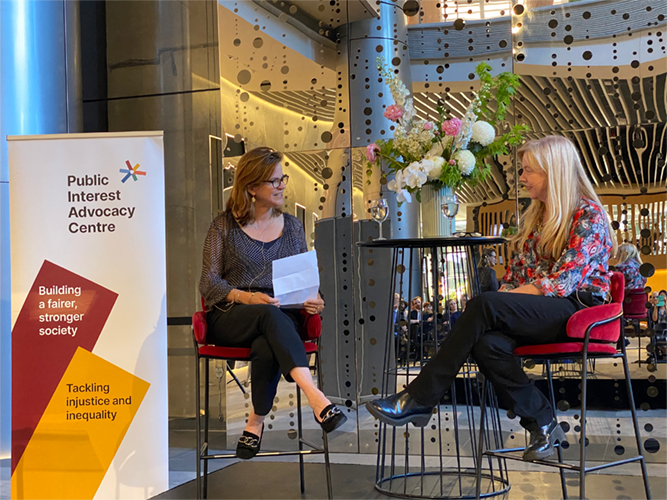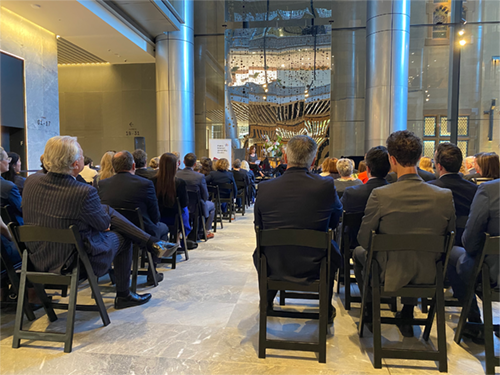- Autumn 2023
- An evening with playwright Suzie Miller

Suzie Miller is a lawyer and playwright. Her play RBG: Of Many, One ran at the Sydney Theatre Company between October and December 2023. Suzie’s other work includes the hugely successful Prima Facie, which will play on Broadway later this year following success on London’s West End and in cinemas as part of the National Theatre Live series.
Nicole Abadee is a former barrister and now the books writer for Good Weekend. She is a regular facilitator at writers’ festivals and speaks to Australian and international writers about their latest releases on her podcast Books, Books, Books.
Nicole intervewed Suzie on 9 November 2022 at the Public Interest Advocacy Centre’s Evening with Suzie Miller, hosted by Banco Chambers. An edited, and abridged transcript of that interview has been prepared by Naomi Wootton for Bar News, in collaboration with PIAC, Suzie and Nicole.

Nicole Abadee (NA): I am delighted to be in conversation with the brilliant playwright, former human rights lawyer and I have to say, my proudest claim to fame, close friend Suzie Miller. I can’t think of anyone better qualified to speak on the topic of storytelling and social justice. We are going to start with a couple of general questions and then we’re going to talk about three of Suzie’s plays in particular: Transparency, Prima Facie and Jailbaby, which is coming to the Griffin Theatre in 2023.
Suzie Miller (SM): She is one of my best friends by the way (laughs).
NA: Your first play Cross Sections was largely based on your experience working at Shopfront [Youth Legal Centre]. You have said that the audience reaction to that play led to your belief that stories can raise awareness, change people and communities and that you came to realise that you could have more impact with your plays than daily court battles. I’m really interested in that.
SM: I was doing a lot of criminal justice work in the Local and District Courts, doing hearings and sentences. In particular, in the sentence matters, I found that the most successful way of conducting them was to really contextualise my client in their life and call upon the judiciary – whoever was sitting on the case – to actually take that into account. But having said that, when I was in that system, it felt like I was plugging up leaks, left, right and centre. Most of my clients ended up back in that court again and as much as I felt it was a really valuable job, I thought I would give storytelling a go.
So the first play that I wrote, Cross Sections, was 24 hours in Kings Cross, and I was trying to humanise the stories of people in that community and bring to light how they tried to support each other. Cross Sections played in Kings Cross at a very small theatre called the Old Fitz and then it transferred to the Opera House. It amazed me that so many members of the audience emailed me and the team, about the impact it had on them. They said, ‘now I don’t drive through Kings Cross in the same way anymore, I drive through and I see these people and I know they have a story and that they could be my cousin’s friend or my friend’s daughter. They could be connected to the life that I lead’. I think the more that you can contextualise someone the more empathy people can have for them.
NA: So, you came to realise that you had more impact with your plays than with your daily court battles. Was that because of the response you got from people to Cross Sections?
SM: Yes, yes. I was telling the same stories at dinner parties but they would fall very flat. People say write what you know. Cross Sections was me writing about what I knew.
NA: So, Suzie, was it a difficult decision in 2009-10 to devote yourself full time to playwriting, to put the law behind you?
SM: It was, only because I actually really loved the law. I think people assume that I didn’t and that’s why I left, but I really loved what I did. I had this one experience, where I gave a lecture at Sydney University. One student came up to me afterwards and said, ‘my sister died on the streets in Kings Cross and I’ve hated her for what she did to my family, but now I understand the despair’. She said she had really re-embraced her love for her sister. I thought, ‘wow, if a story can do that, that is an amazing thing’. That was really valuable to me. In 2009, I was offered a position as a Magistrate, and I was also offered residency at the National Theatre in London. It was literally a fork in the road. And I just knew that I really passionately wanted to take up this opportunity in London and see what was possible. So we all upped sticks and moved to London for that. I was thinking, ‘maybe I’ll go back to law’ but in the end I realised that writing for theatre was the career I really wanted.
NA: Let’s talk about one of your earlier plays, Transparency. You won the Kit Denton Fellowship for Writing with Courage for that script. Tell us about the play and the issues you wanted to explore.
SM: It was a very complex play for me because I was doing all of these sentencing matters and talking about rehabilitation and then I thought, what is rehabilitation? And how do we know when we have achieved rehabilitation? I realised it’s actually an act of faith by the community. And I thought, do I really believe in it then, if it’s an act of faith? I’m not good with acts of faith.
Having said that, I started to consider a conceptual framework around a story where a 10-year-old commits a terrible crime. This is the extreme version obviously, but is that character the same person at 36 when they’re cognitively developed, that they were at 10 years old? And yet, they’re still harbouring the consequences of that 10-year-old’s crime. I wanted to interrogate who that 10-year-old was. In the story, as in some parts of our community, everyone was blaming the child, but I thought if it takes a village to raise a child, where did the village go wrong? Not where did the child go wrong. What was the life of that child like for that to happen? I was a children’s lawyer and I was very much a children’s advocate. I felt very strongly that putting children in prison so young is not an option. I don’t think that a child commits a crime in isolation, without having been taught a certain way of being in the world. That’s my personal belief.
NA: And as you say, without having been failed by the system.
SM: Exactly. The system has failed to step in enough times and the village has not actually raised the child appropriately. As a consequence, a terrible thing happens. But I think it’s about who takes responsibility for that. I can tell you from all the young people I ever saw in prison, [imprisonment] really is never the answer. I went from juvenile detention centre to juvenile detention centre and it is much worse than people imagine. It is really dehumanising for the children. And they learn behaviour within that context that means when they come out there is little hope for a future without an offending pattern. If you’re going to look at it from a public perspective, you’re only doing the public more damage by sending a child to prison. So that’s what the play was about.
NA: Let’s talk now about Prima Facie. As Jonathan said, you’d have to have been under a rock for the last six months to not have heard about it. It was originally produced by the Griffin Theatre Company, Sydney in 2019. Then in the West End in London this year – starring Jodie Comer – where there was a sellout season, huge critical acclaim. The play deals with complex issues around how the criminal justice system fails female complainants of sexual assault. You say, in the playwright’s notes, that the play had been playing out in your head since law school days. What was the issue you wanted to highlight and why was 2019 finally the right time to do that?
SM: The lived experience of a woman who has been sexually assaulted has never been taken into account in the criminal justice system. She is up against all the odds. Now, I am a defence lawyer, so for me to say this is huge because I believe in innocence until proven guilty. But I felt really nervous about sexual assault cases. I thought, why don’t I just tell the story of someone like myself, who is a defence lawyer, who really believes in the system, and what happens when they are on the other side. I wanted us to believe [the sexual assault] happened and then have her cross-examined on that story. To see how it was twisted, that there is no way she could ever have her truth come out in court. Or show how she is cross-examined in a way to make her look like a liar. The law has been built – and no offence to all the men in the audience – by generations and generations of white men. Usually wealthy white men. I thought they’d never understand that experience from only a secondhand retelling. So I wrote this as a one person play about rape where we, as the audience, know this happened to her, and see how that truth is almost impossible for her to prove in court.
NA: Let’s talk about a play of yours that’s coming to Griffin next year. Tell us about Jailbaby. I know it’s based on your experience as a children’s lawyer. What are the issues you wanted to highlight with this play, without giving too much away?
SM: Sure, so one of the things I grappled with when I was a children’s lawyer was that so many of the laws were around property offences. They seemed to carry really heavy sentences – and prison sentences – for young people who were breaking and entering houses or stealing. Somehow, they seem to get worse sentences for that than for hurting a person or threatening a person or sometimes even sexually assaulting a person. I was thinking about the idea that the law is set up for the aristocracy, to protect their property. And their property didn’t just include their estate; it also included their wives. So, if their wives were raped it was an offence and they could claim compensation for it. I thought the law started because of the need to protect title and to protect property – and this is my own theory, the theory of the play – but now in contemporary society that still exists, we still seem to care more about property than humanity.
So I took the case of three boys. Some of them are quite experienced at break and- enters and stealing, and one other is a newby. This new one is so nervous but he thinks he is just the lookout or the cuckoo, but doesn’t realise that with the doctrine of common purpose, he is going to be as guilty of the same offence. In any event the power of the more seasoned boys pressures him into doing more even than looking out, so he is in possession of stolen property. Unfortunately, he sees a soccer jersey he really likes which belongs to the son of the people who have the house, and he takes that. The theft is reported and this new boy gets arrested, gets convicted, and goes to prison. In my experience, often the person who goes to prison is the least involved, the most vulnerable. The person who couldn’t conduct themselves when they got arrested. They also don’t want to dob the other people in because they’re then seen as being ‘dogs’ in the street, and things are even worse for them than sometimes in prison.
So, they go to prison and the shocking thing for me was, as a criminal lawyer, your clients tell you things like you are a priest – like you keep things secret – due to legal professional privilege. And so, unfortunately, I would be privy to what happened to my clients in prison, which was often them being sexually assaulted, sometimes in really horrendous ways. This happened so often, and I would hear these stories so often. And the clients would beg me not to tell their girlfriends on the outside because they felt that would diminish their masculinity, or they’d be teased. When they came out of prison, they were really damaged as the consequence, also really homophobic and with a need to prove their masculinity. Just bearing witness to that was horrific for me and I just suddenly thought, we seem to care more about the big smart-screen television which was stolen than the person in prison. One time I was in court down in the Downing Centre. One of the magistrates said to a client ‘you watch out – if you do this again you’re going to go to prison. And guess what: the boys in prison, even their mothers don’t like them and what they’ll do to you will shock the hell out of you’. And I thought – my god – its state sanctioned torture. But it is not part of your punishment. It is not supposed to happen. Yet we turn a complete blind eye. All of us in this room, including myself, we don’t actually take our government to task over it. We just assume it is a part of what happens in prison. But no one comes out of that who isn’t a very angry, very violent person. It is a terrible thing to inflict upon a young person. It doesn’t happen to everyone in prison and it’s better now than it was, but it still happens a lot.
NA: Suzie, how much of your work as a playwright is informed by your experience as a lawyer? Can you please give us one example ? I can’t resist asking one question about RBG. Tell us about the research you did for that play?
SM: Well, I read every single judgment that she ever wrote. I read every case she ever ran. I read everything. Remember, there was a pandemic – I had a lot of time on my hands. Also, I had every book that was written about her, every essay she wrote, every speech she gave where the transcript was available. I immersed myself in everything to do with her. I was really interested in her as a person to start with, but I became more and more interested as I was reading her words, how eloquently she put her case across and how thoughtful she was when she talked about social justice. It was not an afterthought.
NA: Many playwrights and writers see their role as to merely tell an engaging and entertaining story. You do that in spades, but you obviously see your role as so much more than that: to raise important social justice issues and force people to grapple with them. I’m wondering, in your opinion, how effective is theatre as a medium to drive social change?
SM: Obviously I’m not the only playwright who does that; I think storytelling has always done that. If you go right back to the Greeks, in those stories, in fact a lot of those plays we still see over and over again, people are confronted by a dilemma with a social justice concept at the heart of it. I think human beings are naturally attracted to grappling with a paradox and issues we’re not comfortable with. That’s how we have a dialogue with each other. So I think it’s always been the case. I’ll also let everyone know that I’m writing a few films – and one of them is a rom-com! I feel like I have to say that – which is soout of character – that I’m going to do a rom-com, so it’s not all dour and sad. And also, hopefully you can have a laugh in some of the plays even though they are quite serious plays. BN
You can donate to support PIAC’s work, including the campaign to raise the age of criminal responsibility here: piac.asn.au/support-us/donate/

